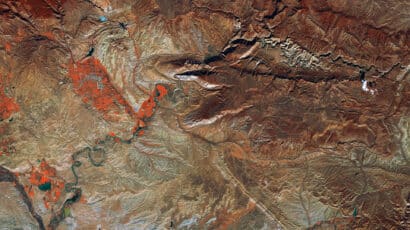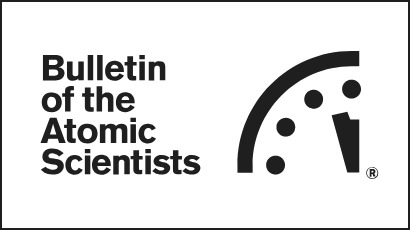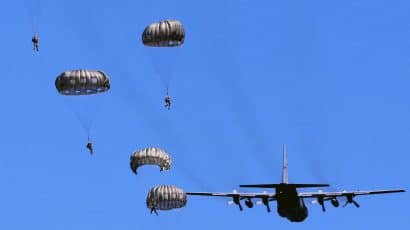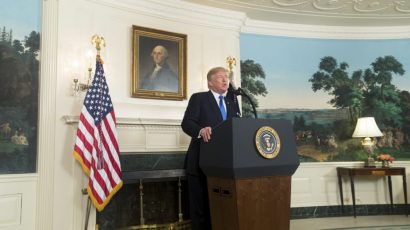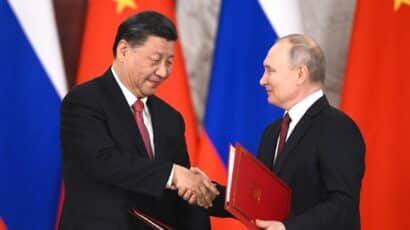Search results for
What are Iranian hardliners saying on social media?
A study of hawkish, anti-reformist accounts shows what President Rouhani is up against.
Desalination: expensive, environmentally problematic, but increasingly necessary
It’s been a long time coming for desalination—de-sal for short. For decades, we have been told it would one day turn oceans of salt water into fresh and quench the world’s thirst. But progress has been slow. That is now changing, as desalination is coming into play in many places around the world.
How the mirage of oil shale riches in Utah threatens the Colorado River
Pulling a single barrel of oil out of shale requires two to four barrels of water, which is exactly what the arid Uinta Basin doesn't have.
The promise of the Syrian chemical weapons plan
The Russia-US deal to eliminate Damascus’ stockpile has achieved a great deal—far more than the alternative would have accomplished
The Black Sea: Center of the nuclear black market
The Black Sea region is one of the world's critical crossroads, a strategic intersection of east -- west and north -- south corridors that enable the free flow of people, ideas, and goods from Asia to Europe and from former Soviet territory to the Middle East and Africa. It is also the center of the world's nuclear black market.
A new transatlantic division of labor could save billions every year!
In this article, the author argues for a strategic reconsideration of one major element of the US defense effort—the commitment to the North Atlantic Treaty Organization. He shows how major reforms in the implementation of US alliance commitments can save as much as $70 billion to $80 billion per year with little change in the risk to US interests.
Artificial intelligence and national security
From Harvard University's Belfer Center, this study of artificial intelligence and its likely security implications is an outstanding one-stop primer on the subject.
Living on a carbon budget. Or, you can’t always get what you want.
The climate problem can’t be solved until humanity learns to distinguish needs from wants. ATV riding may not actually be a human requirement.
The continuing danger of Semipalatinsk
Kazakhstan’s leadership has done little to address pressing humanitarian issues at Semipalatinsk, failing to provide adequate funding for environmental clean up and adequate security for the former Soviet nuclear testing site.
What in the world is weather whiplash?
Weather whiplash—abrupt and disruptive shifts in weather conditions—are expected to become more common as global temperatures rise.
Uncooperative threat reduction
For more than two decades, the United States and Russia have worked together to secure Soviet stockpiles of nuclear, biological, and chemical weapons and materials, but now the future of this unprecedented partnership, the Cooperative Threat Reduction agreement, is in jeopardy. After several months of negotiations, Russian officials have publicly stated that they will not renew the current agreement, which forms the legal basis for cooperation between the two countries and is set to expire in July 2013.
Radiation risks are real. But no cause for radiophobia.
A woman’s son broke his leg and had an X-ray. Three weeks later, she was still so afraid of radiation that she would not hug him.
Restarting negotiations with Iran
Because it has done so much to create the impasse with Iran, the Trump administration should lead the process toward actual negotiations, relaxing some of the sanctions now in place, reinstating the waivers that allowed European allies to buy Iranian oil, and withdrawing some of its military forces.
Say goodbye to the Iran deal and hello to a “polynuclear” Middle East
If Trump pulls out of the Iran nuclear deal, that could lead to a Middle East with more than just one or two nuclear-armed states.
Israel ponders a nuclear Iran
Of all the international nuclear-related challenges facing Israel, the most urgent and important is the possibility of a nuclear Iran.1 Israel's intense response to Iran tells us much about Israel's own existential predicament. The consensus in Israel is that the advent of a nuclear Iran, albeit depending on what this would mean exactly, would pose an unprecedented threat to Israel. For the first time, Israel would confront a hostile state in the region that possesses nuclear weapons.
Libya, Belarus, and dealing with dictators
Dealing with thuggish dictators reluctant to relinquish their stockpiles of highly enriched uranium (HEU) is a necessary component in the global effort to secure vulnerable fissile materials by 2013. Unfortunately, nuclear deals are often tentative and prone to collapse if a dictator's whims change. The successful nuclear deal with Libya and the stalled deal with Belarus are indicative of this dynamic, but it should not stop the United States and other nations from seeking deals to secure fissile materials that might otherwise be exploited by would-be nuclear terrorists.
Establishing the next president’s national security agenda: How to confront the defense budget morass
When we think about controlling the budget, we think about things like Medicare, Social Security, and urgent domestic needs such as education and alternate minimum taxes. But the most urgent fiscal and planning challenge the next president will face is the defense budget.
The North Korea that can say no
Some years ago, I spoke with a former Soviet official who had worked in North Korea. He said that you could try to direct, cajole, or nudge the leadership to do something that, to a foreigner, looked to be in their best interests. They would smile, seem to nod assent, or might even say yes, … Continued
How Chinese military aid to Russia could lead to a strategic reversal of nuclear forces
Russia may try to buy massive amounts of Chinese weapons by transferring weapons-grade plutonium—a deal that would have severe, long-term strategic consequences.



